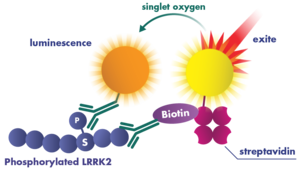LRRK2 Cellular Phosphorylation Assay (intracellular kinase activity assay) for compound screening and profiling in intact cells
LRRK2 (Leucine-rich repeat kinase 2) is a serine/threonine protein kinase that phosphorylates a broad range of proteins involved in multiple cellular processes (e.g. autophagy, vesicle trafficking, neuronal plasticity). It is composed of a unique series of conserved protein domains including amongst others a kinase domain, a leucine-rich repeat (LRR) domain, and a GTPase domain.
Pathogenic mutations in the LRRK2 gene are the most common cause for the onset of familial or sporadic Parkinson’s disease. Aberrant LRRK2 hyperactivity caused by these mutations (e.g. G2019S) results in neurotoxicity and protein aggregation caused by dysfunctional autophagy and vesicle trafficking. Most pathogenic mutations are located in the LRRK2 kinase or GTPase domain. Thus, LRRK2 inhibition represents a promising strategy for therapeutic intervention in the context of Parkinson’s disease.
LRRK2
Leucine rich repeat kinase 2, DARDARIN, PARK8, ROCO2, DKFZp434H2111, FLJ45829, RIPK7
A549
Endogenous
The human non-small cell lung cancer cell line A549 endogenously expresses high levels of LRRK2, resulting in constitutive autophosphorylation at Ser935. LRRK2 inhibition results in reduced phosphorylation of Ser935.
Phosphorylation at residue Ser935 as a readout of intracellular kinase activity via AlphaLisa technology.

Phosphorylated LRRK2 is quantified by AlphaLisa technology using two antibodies, one which is specific to the phosphorylated Ser935 and one which recognizes LRRK2. The antibodies are bound to acceptor and donor beads, respectively. The proximity of the beads enables singlet oxygens, a radical oxygen form, to transfer energy to the acceptor beads inducing luminescence.
AlphaLISA assays stand for amplified luminescent proximity homogeneous assay. These assays are well-validated and provide an excellent detection window. A simple add-mix-read protocol with no wash steps guarantees high reproducibility.
Freiburg, Germany
More information can be found on our website Cellular Phosphorylation Assay Services.
Reference compound IC50 for LRRK2

The well-described inhibitors MLi-2, PF-06447475, GNE0877, and LRRK2IN1 potently inhibit LRRK2 activity in the cellular phosphorylation assay. All compounds were included in the validation process and the cellular phospho-Ser935 LRRK2 assay generated highly reproducible IC50 values. The graphs show representative results.
| Compounds | IC50 (M) |
|---|---|
| MLi-2 | 9.8e-10 |
| PF-06447475 | 7.7e-09 |
| GNE0877 | 6.6e-08 |
| LRRK2IN1 | 6.6e-08 |